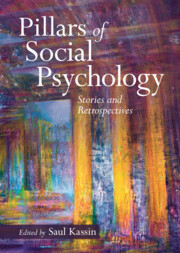Book contents
- Pillars of Social Psychology
- Pillars of Social Psychology
- Copyright page
- Contents
- Contributors
- 1 Introducing the Pillars of Social Psychology
- 2 Seven Decades in Social Psychology
- 3 A Career Emerging from an Unnecessary Analysis
- 4 Once a Social Psychologist, Always a Social Psychologist
- 5 Abe and Leon and Me
- 6 My Contributions to Social Psychology Over Many Decades
- 7 Influences and Dissonances
- 8 From Ideomotor Theory to the IAT in Just 35 Years
- 9 Curiosity
- 10 The Emergence and Evolution of Social Realities
- 11 The Good Old Days
- 12 “What Ever Happened to that Blond Girl?”
- 13 A Quest for Social Psychology That Spans the Psychological and the Social
- 14 Reasoning
- 15 Chance and Choice
- 16 Looking Back on a Charmed Career
- 17 My Train Ride to Social Psychology
- 18 The Making and Remaking of a Cross-Cultural Psychologist in Six Acts
- 19 A Professional Past of Arranging to Be Compelled
- 20 A Social Psychological and Personality Approach to Human Motivation
- 21 Wandering into Psychology and Law
- 22 My Meandering Journey into Social Psychology
- 23 A Career in Ten Episodes
- 24 Getting Lucky
- 25 Mindsets
- 26 Social Psychology and Me
- 27 My Life as a Social Psychologist
- 28 You Can’t Be a Self by Yourself
- 29 Getting to Here from There
- 30 A Relational Life
- 31 Planning Is Overrated
- 32 Symptoms, Secrets, Writing, and Words
- 33 How Chance Encounters Can Foster a Career
- 34 A Multi-Decade Journey between the Lab and the Real World
- 35 A Long and Winding Road
- 36 Tales of a Devoted but Disillusioned Party Crasher
- 37 Social Cognition, Always the Great Beyond
- 38 The Accidental Social Psychologist
- 39 The Power of Firmly Held Beliefs
- 40 My Career in Social Psychology
- 41 Chasing Self-Esteem
- 42 The Basement Tapes
- 43 Evolutionary Social Psychology
- 44 One Man’s Search for (the Assignment of) Meaning
- 45 Meetings with Remarkable Men: A Fortunate Journey in Social Psychology
- 46 Dear Vera, Chuck, and Dave
- 47 Always Buy the Handbook of Social Psychology (1968) at a Railway Station in India
- 48 Empowering People to Break the Prejudice Habit
- 49 Seeking the Middle Way
- 50 The Pillars, Their Stories, Retrospectives, and Signals Loud and Clear
- Index
- References
20 - A Social Psychological and Personality Approach to Human Motivation
Published online by Cambridge University Press: 29 September 2022
- Pillars of Social Psychology
- Pillars of Social Psychology
- Copyright page
- Contents
- Contributors
- 1 Introducing the Pillars of Social Psychology
- 2 Seven Decades in Social Psychology
- 3 A Career Emerging from an Unnecessary Analysis
- 4 Once a Social Psychologist, Always a Social Psychologist
- 5 Abe and Leon and Me
- 6 My Contributions to Social Psychology Over Many Decades
- 7 Influences and Dissonances
- 8 From Ideomotor Theory to the IAT in Just 35 Years
- 9 Curiosity
- 10 The Emergence and Evolution of Social Realities
- 11 The Good Old Days
- 12 “What Ever Happened to that Blond Girl?”
- 13 A Quest for Social Psychology That Spans the Psychological and the Social
- 14 Reasoning
- 15 Chance and Choice
- 16 Looking Back on a Charmed Career
- 17 My Train Ride to Social Psychology
- 18 The Making and Remaking of a Cross-Cultural Psychologist in Six Acts
- 19 A Professional Past of Arranging to Be Compelled
- 20 A Social Psychological and Personality Approach to Human Motivation
- 21 Wandering into Psychology and Law
- 22 My Meandering Journey into Social Psychology
- 23 A Career in Ten Episodes
- 24 Getting Lucky
- 25 Mindsets
- 26 Social Psychology and Me
- 27 My Life as a Social Psychologist
- 28 You Can’t Be a Self by Yourself
- 29 Getting to Here from There
- 30 A Relational Life
- 31 Planning Is Overrated
- 32 Symptoms, Secrets, Writing, and Words
- 33 How Chance Encounters Can Foster a Career
- 34 A Multi-Decade Journey between the Lab and the Real World
- 35 A Long and Winding Road
- 36 Tales of a Devoted but Disillusioned Party Crasher
- 37 Social Cognition, Always the Great Beyond
- 38 The Accidental Social Psychologist
- 39 The Power of Firmly Held Beliefs
- 40 My Career in Social Psychology
- 41 Chasing Self-Esteem
- 42 The Basement Tapes
- 43 Evolutionary Social Psychology
- 44 One Man’s Search for (the Assignment of) Meaning
- 45 Meetings with Remarkable Men: A Fortunate Journey in Social Psychology
- 46 Dear Vera, Chuck, and Dave
- 47 Always Buy the Handbook of Social Psychology (1968) at a Railway Station in India
- 48 Empowering People to Break the Prejudice Habit
- 49 Seeking the Middle Way
- 50 The Pillars, Their Stories, Retrospectives, and Signals Loud and Clear
- Index
- References
Summary
After I graduated from high school, in 1960, I was a student for four years at Hamilton College. Mathematics was my major, but I became increasingly interested in psychology during that period. Many years before I was at Hamilton, B. F. Skinner had been a student there, and by the time I got there the psychology faculty’s research was based entirely on Skinner’s operant theory, which was focused primarily on rewards, although they were called reinforcements. Similarly, the psychology program for students was entirely operant-theory-based.
- Type
- Chapter
- Information
- Pillars of Social PsychologyStories and Retrospectives, pp. 169 - 176Publisher: Cambridge University PressPrint publication year: 2022



